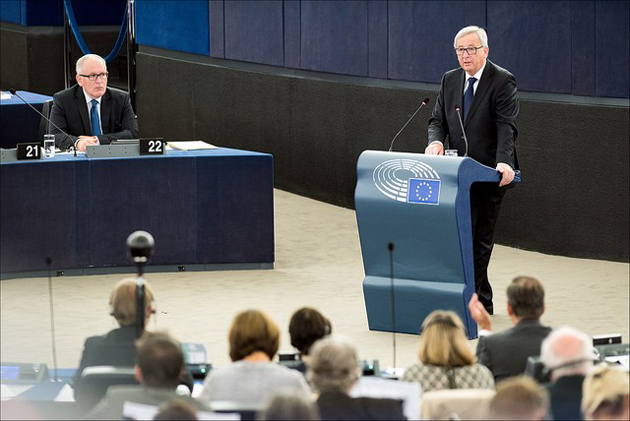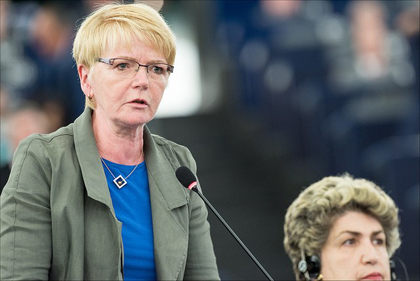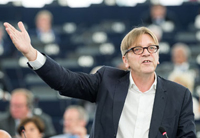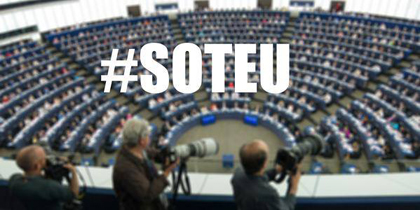Juncker: “We should be proud that Europe is seen as a place of refuge”
In the first speech given by a president of the Comission elected directly by the EP, Juncker focused his State of the European Union address almost exclusively on the refugee crisis.
BRUSSELS · 09 SEPTEMBER 2015 · 17:08 CET

Big day for Europe since the beginning of the refugee or (so-called) migrant crisis. The president of the Commission, Jean-Claude Juncker, gave his first State of the (European) Union speech.
This speech is addressed to the European Parliament during the plenary session of September and is meant to be an account of what the European Commission has been doing during the past year, and what are the priorities for the next.
There was expectancy because he was meant to deliver his plan for the refugees as it is the first topic in the agenda, and indeed, he overran his speaking time focusing almost exclusively on the asylum crisis and excluding other topics of his previously announced list of 10 priorities. He apologized during his speech, had to summarize the rest of the points and said the list would be available and discussed in following debates.
“TOO MUCH FINGER-POINTING”
Mr. Juncker stressed that his first priority was to address the refugee crisis and he strongly criticised the Member States for their lack of cooperation and although he mainly avoided the word “solidarity”, he implicitly talked about it. “There has been too much finger-pointing these past weeks. Brussels is accused of not doing the job that member states should be doing.”
The president of the Commission asked the ones who say that we cannot take everybody to put numbers into perspective: “Refugees represent 0,11% of the total population of the EU. Who are we to be making comparisons?” and stated that if “Europe is seen today as a place of exile and refuge, this is something to be proud of and not something to fear”.
“Winter is approaching”, said Mr. Juncker to the importance of taking care of the asylum seekers and he firmly condemned the countries that were “selecting” them: “Are we distinguishing between Christians, Muslims, Jews? There is no religion, no belief, no philosophy when it comes to refugees!”
The president also praised the efforts of Syria’s neighboring countries “by far poorer than we are” in receiving millions of Syrian refugees.
OPENING LEGAL WAYS FOR MIGRATION

Of course, the refugee crisis opened the debate on migration. Gianni Pitella, from the Socialists (S&D), and Gabriele Zimmer, from the European United Left (GUE/NGL), insisted on the word solidarity while others repeated the importance of making distinctions between economic migrants and refugees.
Syed Kamall, from the eurosceptic Conservatives (ECR), tried to downplay Europe: “Let’s seat around the table but not only the EU: it is an international crisis” and insisted on taking care of refugees (with economic aid) in the camps of Jordan and Lebanon instead of bringing them here. On the other hand, the leader of the liberals Guy Verhofstadt, the most active federalist in the EP, wondered “how can we make a distinction if we have 28 [legal migration] systems?”
ECONOMIC CRISIS, GREECE AND UNEMPLOYMENT
The President of the Commission barely had time to discuss other important concerns for the European citizens. He congratulated himself and his team for preventing the “Grexit” and thanked Alexis Tsipras for “having changed course”. He warned that the crisis is not finished: “We should not quit the goal of making Europe a country… ermm a continent”, Mr. Juncker corrected while euroskeptics jumped from their seats, “where there is full employment”.
The left and socialist parties from the hemicycle criticized Jean-Claude Juncker not talking about issues such as the increasing divide between rich and poor, 0-hours contracts or social dumping. “You did not say anything about social priorities”, remarked Gabriele Zimmer, from GUE/NGL, referring to Jucker’s statement of “my heart is full of social” at the beginning of the address. “Of what union are we talking about when the only growth we can talk about is the increase of exclusion, unemployment…?” wondered Philippe Lamberts, from the Greens.
ABSENCES AND PRESENCES
08:58 CET. The situation was not promising. Two minutes before the speech started, the hemicycle was almost empty, with a few MEPs standing here and there. There were more journalists and cameras than politicians and although the room filled pretty fast between 9 and 9:06, at the end there were quite a few empty seats.

The absence of the permanent president of the Council, Donald Task, was also repeatedly mentioned as an example of the lack of implication from member states. Mr. Lamberts talked about the European Council as “the theatre of national egotisms”.
On the other side, the High Representative of the Union for Foreign policy, Federica Mogherini was present and Mr. Juncker took the opportunity to praise her performance. “She is high because she is highly determined”, he jokingly said. However, he did imply that more was to be done in addressing the “root causes” of the refugee crisis. As Mr. Verhofstadt also said, the EU has been turning its back on Syria: “we cannot look away: there will always be a price to pay” and mentioned ISIS and terrorism too.
Ms. Mogherini spoke in front of the EP later in the morning and gave an answer to Mr. Verhofstadt. She stressed that her first priority is to save lives and that the second is to address those root causes but, she said that Europe’s credibility depends on its internal unity: “We should act well, fast and united”.
“ALORS, CONTINUONS”
This is the first State of the Union speech delivered by a president of the Commission who has been directly elected by the European Parliament, and indirectly by the citizens when they voted for the EP elections in May 2014.
The President of the Commission is always expected to be a committed European and promote the “general preferences” of the Member states but at the same time, he has to transcend these in favor of the European project.
Mr. Juncker reaffirmed his intention of making the Commission more political “in the very best connotation of this word”. “It is not my intention to politicize everything, but it is not time to do business as usual”. He insisted on making Europe as a model for others and deeply regretted “the lack of Europe and the lack of Union”.
He ended his speech as it was predicted: an encouragement to more integration, which of course did not please to any of the eurosceptics in the hemicycle. Mr. Juncker did not want to paint a “rosy” situation for Europe but he finished: “I know the weaknesses of Europe, but I know the weaknesses there would be if Europe did not exist. So, let’s go on.”

Published in: Evangelical Focus - europe - Juncker: “We should be proud that Europe is seen as a place of refuge”
